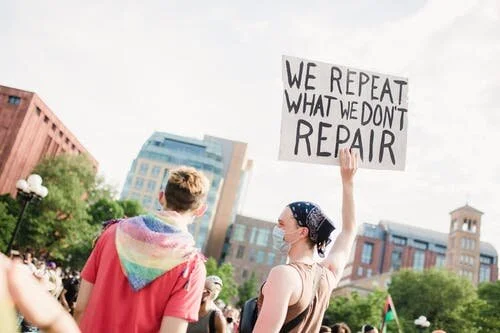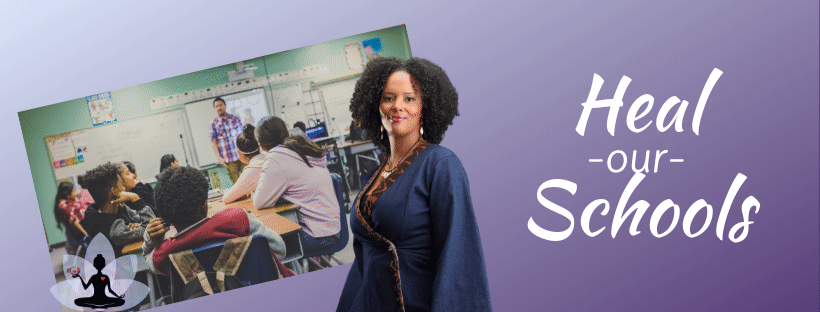Ep. 104: Interrupting Whiteness One Zoom Session At a Time
EQ: Why do we need racial affinity groups to combat racism and how do they lead to sustainable change?
Guests:
Emily Meadows is an LGBTQ+ consultant and published author specializing in international schools. If you missed our conversation on creating inclusive spaces, go download Episode 99.
Tamara Friedman is a NBCT, school leader, and classroom teacher. She works towards implementing culturally relevant and anti-racist pedagogy in her classrooms and currently teaches 4th grade at The American School of the Hague.
In this episode we discuss the distinctive ways that racism and white supremacy manifest in an international school context. While commonly appearing in the form of deflection because the school is “diverse”, explicit anti-racism work is long overdue. Our guests, Emily and Tamar, share their journey to establishing the Whiteness Accountability Group for International Educators including how it is rooted in volunteer participation, leading through vulnerability and story-telling, and collective leadership. Additionally, they discuss the need for accountability to each other, group participants, and to people of color.
To understand the purpose and framing of racial caucusing, check out the following documents:
Do Your Fudging Homework:
Hope: Racial Equity Tools & Culturally responsive Leadership, Me & White Supremacy by Layla Saad
Megan: If you work in a school, make sure you know what your School’s Culturally Responsive Teaching policies are and know who the leadership team is that is responsible to implementing those.
Tamara: Franchise Kendall Understanding White Privilege and Harvard Implicit Bias Test
Emily: Join our group by emailing us; Learning for Justice Standards;
Ep. 77: Racial Healing Is A Crucial Component for Achieving Equity
EQ: Why is racial healing a crucial component for achieving equity in our schools and communities?
Guest: Tovi Scruggs-Hussein is “a visionary educator, author, and award-winning urban high school principal with over 25 years of emotional intelligence training.” Her work on self-transformation and healing through courageous leadership development can be found at Ticiess. Highlights from our discussion include recognizing that educators can be smart and dedicated but still be racist (and uphold racist infrastructure in schools). We further discuss how to make long term change, and grow our compassion for colleagues and students. We cannot serve our students unless we are more balanced in our own personal lives and truly understand our racial and cultural identities. In education, we often ignore that both teachers and students experience educational trauma. It’s only through acknowledgement of this trauma and pursuit of healing that we can achieve equity for all students.
Additional resources:
Do Your Fudging Homework:
Annie: Do some additional research about radical empathy!
Hope: Go read about Racial Healing Allies--download the ebook & sign up for an e-course
Tovi: Please pace yourself (white folks!) and do not burn out.
Follow us on Twitter @IWL_Podcast or Facebook: Interchangeable White Ladies Podcast
Don’t forget to pick up your copy of The Body is Not an Apology for the #readlessbasic book club
Ep. 51: Regressive and Racist: A Chat About Taxes
EQ: How are taxes a social justice issue and what are smart people doing about it?
Guest: Alison Cheung, Guest from Channel 253 Adult Civics Happy Hour “The Case for Progressive Taxation”
Communications Hub Manager at Fuse Washington, a progressive political organization. Alison is a graduate of the University of Washington, where she worked on education accessibility and yelled a lot about racist housing covenants. She is currently working on tax reform.
Alison drops some serious knowledge about Washington’s ass-backwards tax system and how it hurts people in poverty, especially people of color. Sub-topics include her effort to stop using the word marginalized (see UW Dream Project), the important work of Fuse Washington in tax justice issues, helping progressives tell a better story (via The Poet Salon and All in For Washington), working with communities that have been most impacted by our tax structure there, the systemic problems with our state tax structure (it’s regressive!), and possible solutions (a more progressive Real estate excise tax, ending Tax Breaks & loop holes - Washington State Budget & Policy Center, better distribution of wealth, and actually getting people to care about poor Black and brown communities). Additional reading includes (but is not limited to): How Racism Kept Black Tacomans from Buying Houses for Decades.
Champagne & Real Pain:
Champagne - we want to raise a glass for:
Ava DuVernay for her new Netflix creation, “When They See Us” about the Central Park 5. DuVernay is a queen of cinema and a national treasure.
Roxanne Gay!! Redefining a type of voice a queer woman can have
EJ Ramos--model minority mix is erasing other Asians
Real Pain - we want to call one out for
Meghan McCain for hypocritically accusing Amy Klobuchar of exploiting her father John McCain’s legacy for political gain. That’s literally Meghan’s day job.
Do Your Fudging Homework:
Annie: pressure your legislators to fix our broken tax system that hurts everyone except the wealthiest. Go on leg.wa.gov to find their contact information and turn up the heat.
Hope: The Breakup Playlist on Netflix
Alison: Jeff Chang “We Gonna Be Aight” (check out the NerdFarmReads episode)
Ep. 38: Racial Equity in AP, IB, and Honors Courses Matters
EQ: Why is educational access and access to rigorous, transformative educational experiences important?
Guest: Kim Thomas, Partnership Director for Equal Opportunity Schools and total badass. “Kimberly is deeply committed to educational access, equity and transformation and to the challenging, but critical work of ensuring that marginalized students have access to rigorous, transformative educational experiences.”
This episode takes a deep dive into equity issues in schools with the incisive, brilliant, and hilarious Kim Thomas. Topics include:
Kim’s experience growing up on the south and, later, eastside of Tacoma and her enrollment in Lincoln High School’s one and only AP course in the mid-90s.
Gatekeeping among school staff and within school systems that limits access to rigorous coursework for historically undeserved populations.
The Race Gap in High School Honors Classes—The Atlantic
The Two Faces of AP —NY Times
When i Comes to Advanced Coursework, Equity Matters—Nate Bowling
When Educators Act Like Gateways—Art Worrell
When You’re the Only Black Kid in a Sea of White Faces—Anjanique Barber
Defining rigor in the context of AP and IB courses (HINT: it’s not just a ton of work of a fast pace)
Committing to the work of racial equity in high-rigor coursework by both getting students in the door and supporting them in their context to be successful.
Guilty Favesies (accidental food theme):
Kim: all manner of delightfully junky food
Annie: Giant American tortillas
Hope: late night Taco Bell quesadillas with green sauce
Do Your Fudging Homework:
Kim: Scene on Radio “Seeing White” series
Annie: for educators - examine academic gatekeeping in your building
Hope: look at your own workplace and practice with the goal of being more equitable




